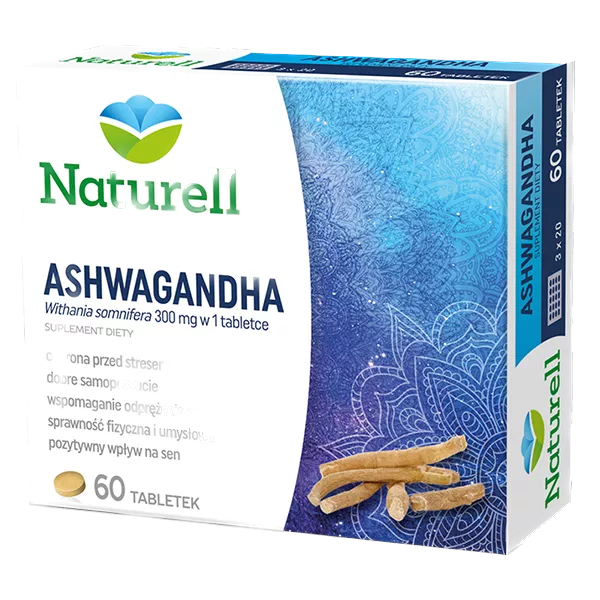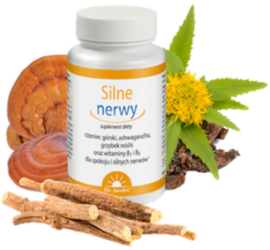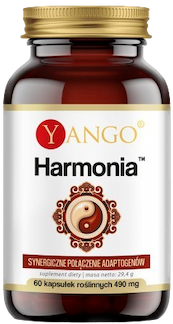What not to mix with ashwagandha? Interactions + examples
Ashwaghanda is an adaptogen that influences the effects of medicines, supplements and herbal preparations.


Learn more about our editorial process
.

Learn more about our editorial process
.

Learn more about our editorial process
.

Learn more about our editorial process
.
Why you can trust us
Articles on Natu.Care are written based on scientific research, data from government websites and other reliable sources. The texts are written in cooperation with doctors, nutritionists and other health and beauty experts. Articles are reviewed before publication and during significant updates.
.Learn more about our editorial process
.Information about advertisements
Content on Natu.Care may contain links to products from the sale of which we may receive a commission. When creating content, we adhere to high editorial standards and take care to be objective about the products discussed. The presence of affiliate links is not dictated by our partners, and we select the products we review ourselves completely independently.
.Learn more about our terms and Conditions
.Ashwagandha in combination with certain plants or active substances enhances each other's effects. Sometimes you want to more calm down or give yourself more energy, so you put on your alchemist's hat and combine. Maybe classically you want to do well, and ashwagandha is just a plant after all...
Unfortunately, some combinations may harm you, as ashwagandha is a potent adaptogen, not... siano. So before you create your 'stack' with ashwagandha, ask your Master Alchemist (doctor) for his/her opinion and find out what are the explosive combinations with ashwagandha.
From this article you will learn:
- With which medicines, supplements and herbs not to combine ashwagandha.
- What are the contraindications to the use of this plant.
- How to use ashwagandha safely.
- What are the benefits of using ashwagandha.
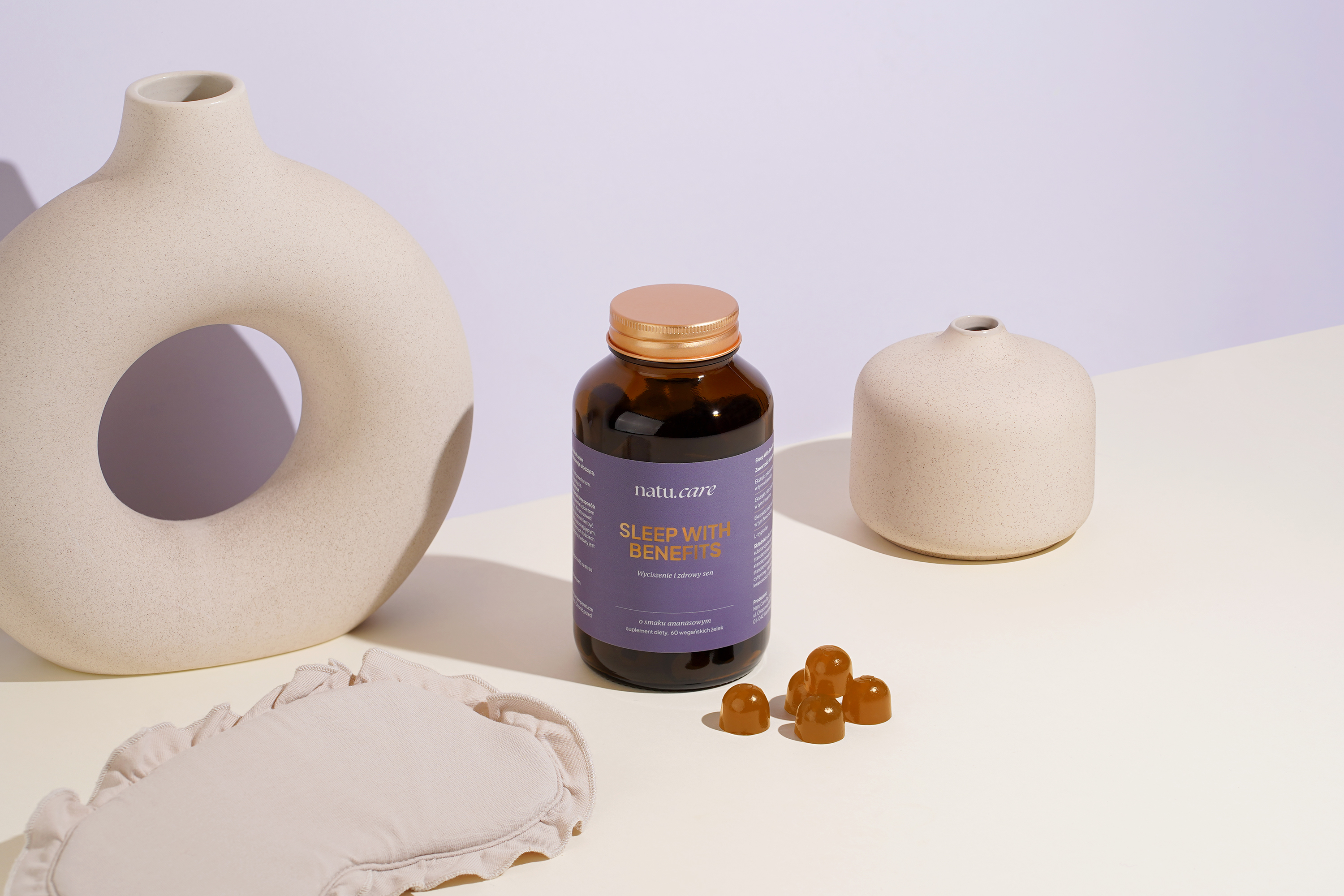
Sprawdź, za co pokochały go tysiące klientek Wegańskie żelki na sen, Ashwagandha KSM-66, ananas. -15% z kodem BLOG15
Wegańskie żelki na sen, Ashwagandha KSM-66, ananas
Wreszcie się wyśpisz! Wegańskie żelki na sen z najwyższej jakości ashwagandhą KSM-66®, ekstraktami ziołowymi i tryptofanem utulą Cię do snu.
Zobacz cenę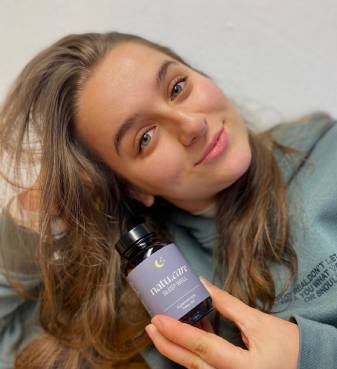
Bez problemu wstaje rano z budzikiem, co wcześniej się nie zdarzało, mam więcej energiiEwa Szczapinska
See also:
- Ashwagandha
- Ashwagandha - dosage
- Ashwagandha - contraindications to use
- Ashwagandha - side effects
- Ashwagandha - morning or night?
- Ashwagandha - when does it start working?
- Indian ginseng
- Adaptogens
Ashwagandha - what not to combine with?
Ashwagandha should not be combined with medications: for thyroid, blood thinners, immunosuppressants, sleeping pills, sedatives, antihistamines, antidiabetics, contraceptives, antiepileptics and blood pressure regulators . Combining it with these agents may, for example, increase sedative effects.
Ashwagandha may also weaken or exacerbate the effects of the drugs themselves, which negatively affects health.
Also, ashwagandha should not be combined with alcohol and dietary supplements or herbs with calming, sedative effects containing valerian or St. John's wort .
Interactions of ashwagandha with medications
Below you will find a table with groups of medications that should not be used concurrently with ashwagandha along with examples given of the most popular preparations available .
|
Group of drugs |
Examples of medicines available in Poland |
|
Regulating hormones thyroid |
Letrox, Eurhyrox, Thyrozole |
|
Used in the treatment of depression, anxiety |
Cital, Dulsevia, Pramolan, Anafranil, Amitriptyline, Fevarin, Xanax, Parogen |
|
Regulating high blood pressure |
Torsemed, Captopril, Prestarium, Telmizek, Hydrochlorothiazide |
|
Blood thinners (anticoagulants) |
Warfin, Pradaxa, Xarelto, Aspirin, Acard |
|
Immonosuppressants |
Metypred, Prograf, Equoral, Endoxan, Azathioprine |
|
Somnolent |
Miansen, Mirror, Zopiclone, Zolpidem, Trittico |
|
Antidiabetic |
Pioglitazone, Metformax, Amaryl, Forxiga, Jardiance |
|
Antihistamines |
Allertec, Clatra, Lirra Gem, Zyrtec, Clatra |
|
Antiepileptic |
Sabril, Zonisamidum Neuraxpharm, Milocardin, Rivotril, Hydacorn |
The use of ashwagandha with these medications may intensify, reduce or nullify their effects . Before taking ashwagandha preparations or teas, consult your doctor.
Ashwagandha Naturell
Product description
Extract from ashwagandha leaves and root will boost energy, overcome fatigue, improve memory and concentration. The product is recommended during periods of increased physical tension or intense physical activity.
Pros and cons
Extract from ashwagandha leaves and root will boost energy, overcome fatigue, improve memory and concentration. The product is recommended during periods of increased physical tension or intense physical activity.
Additional information
Extract from ashwagandha leaves and root will boost energy, overcome fatigue, improve memory and concentration. The product is recommended during periods of increased physical tension or intense physical activity.
Dr. Jacob's Strong Nerves
Product description
Dr. Jacob's Strong Nerves is a dietary supplement thatóry supports the nervous system and helps the body to cope with stress. Thanks to the synergistic combination of beneficial ingredientsós, Strong Nerves relieves anxiety symptoms, increases mental and physical stamina, and supports concentration.
The benefits of this supplement are particularly important for peopleóly exposed to chronic stress, those with sleep problems or employeesóly. It is worth mentioning that the supplement can also help to improve mental well-being and support the immune system.
.All this makes Dr. Jacob's Strong Nerves an excellent remedy for anyone looking for comprehensive support for their nervous system and overall mental performance.
Pros and cons
Dr. Jacob's Strong Nerves is a dietary supplement thatóry supports the nervous system and helps the body to cope with stress. Thanks to the synergistic combination of beneficial ingredientsós, Strong Nerves relieves anxiety symptoms, increases mental and physical stamina, and supports concentration.
The benefits of this supplement are particularly important for peopleóly exposed to chronic stress, those with sleep problems or employeesóly. It is worth mentioning that the supplement can also help to improve mental well-being and support the immune system.
.All this makes Dr. Jacob's Strong Nerves an excellent remedy for anyone looking for comprehensive support for their nervous system and overall mental performance.
Additional information
Dr. Jacob's Strong Nerves is a dietary supplement thatóry supports the nervous system and helps the body to cope with stress. Thanks to the synergistic combination of beneficial ingredientsós, Strong Nerves relieves anxiety symptoms, increases mental and physical stamina, and supports concentration.
The benefits of this supplement are particularly important for peopleóly exposed to chronic stress, those with sleep problems or employeesóly. It is worth mentioning that the supplement can also help to improve mental well-being and support the immune system.
.All this makes Dr. Jacob's Strong Nerves an excellent remedy for anyone looking for comprehensive support for their nervous system and overall mental performance.
Solve Labs Brain Tech Memory & Focus, adaptogens, capsules

- Composition: bacopa monieri, gotu kola, rhoiola rosea, ginseng, zinc gluconate, choline, vitamin B6
- Form: capsules .
- Packaging: 30 or 60 capsules .
- Dose: 2 capsules daily .
- Sufficient for: 10 or 20 days .
Product description
Adaptogens, vitamins and minerals to support the mózg and nervous system. Brain Tech has been developed for people needing long-lasting concentration, improved learning ability, memory and increased resistance to stress.
Pros and cons
Adaptogens, vitamins and minerals to support the mózg and nervous system. Brain Tech has been developed for people needing long-lasting concentration, improved learning ability, memory and increased resistance to stress.
Additional information
Adaptogens, vitamins and minerals to support the mózg and nervous system. Brain Tech has been developed for people needing long-lasting concentration, improved learning ability, memory and increased resistance to stress.
Adaptogens, vitamins and minerals to support the mózg and nervous system. Brain Tech has been developed for people needing long-lasting concentration, improved learning ability, memory and increased resistance to stress.
YANGO, Harmony, adaptogens, capsules
Product description
This dietary supplement contains a synergistic combination of 5 plant extracts that positively influence the body's homeostasis and well-being. The product is recommended for people living under stress, tension and those who are physically active.
Pros and cons
This dietary supplement contains a synergistic combination of 5 plant extracts that positively influence the body's homeostasis and well-being. The product is recommended for people living under stress, tension and those who are physically active.
Additional information
This dietary supplement contains a synergistic combination of 5 plant extracts that positively influence the body's homeostasis and well-being. The product is recommended for people living under stress, tension and those who are physically active.
Products contain affiliate links
Ashwagandha vs antidepressants
Do not combine ashwagandha with antidepressants, as this plant has activity similar to some preparations used to treat depression through its effect on serotonin receptors .
Combining ashwagandha with certain medications results in interactions and may affect the efficacy and safety of prescribed pharmacotherapy.

Kacper Nihalani doctor
Antidepressant medicines
The drugs used to treat depression are divided into groups: SSRIs (selective serotonin reuptake inhibitors), SNRIs (serotonin-norepinephrine reuptake inhibitors), TLDs (tricyclic and quadricyclic antidepressants), MAOs (monoamine oxidase enzyme inhibitors) .
In 2021, the results of a study examining the effects of ashwagandha on generalized anxiety disorder (GAD, Generalized Anxiety Disorder) were published. Forty people taking SSRI drugs were divided into two groups in which they took:
- 1 g ashwagandha extract,
- placebo.
After 6 weeks, subjects taking SSRIs and the extract showed a reduction in the severity of GAD symptoms .
But this is only one study, conducted under controlled conditions. It cannot be concluded on its basis that concomitant use of SSRIs and ashwagandha is safe.
In other preclinical studies, ashwagandha has been found to affect GABAergic and serotonin activity, which are important pathways for the mechanism of action of SSRIs, so it is better not to use these concomitantly.
SSSRI drugs are metabolised by CYP450 enzymes. There are currently no study results showing that ashwaghandha affects this important metabolic pathway. Many drugs, as well as alcohol, caffeine and nicotine, are metabolised by these enzymes.
 .
.
Kacper Nihalani doctor
Ashwagandha and alcohol
Do not drink alcohol while taking ashwagandha preparations or teas. Alcohol is a psychoactive substance, specifically a depressant .
Ashwagandha induces the release of neurotransmitters that have an inhibitory effect on the central nervous system, meaning that signals between nerve cells are transmitted more slowly.
 .
.
Kacper Nihalani doctor
Scientific research suggests that ashwagandha may play a role in regulating detoxification enzyme activity and participate in the cleansing process at the cellular level .
Alcohol has a toxic effect on the body, so the simultaneous use of these substances can cause a reduction in tolerance to alcoholic beverages, and can lead to unpleasant discomforts such as drowsiness, headache, stomach discomfort and kac-gigant.
Ashwagandha versus other plants
Consider dietary supplements and herbs with calming, sedative and sleep-enhancing effects. Ashwagandha can also exacerbate their properties in adverse ways, causing 'fogginess', concentration problems or excessive daytime sleepiness .
Ashwagandha should not be combined with valerian and wort . There are no scientific studies verifying the effects of using these herbs simultaneously. Due to their similar action profile, they may exacerbate each other's sedative and sleeping properties.
Focus on quality, not quantity. Test the effects of different preparations, but not all at once, as this may do more harm than good.
Test the effects of different herbs.
Power of plants
Valerian is known for its sedative, anti-anxiety and anticonvulsant properties. Studies have shown that valerian extracts can affect the dopaminergic and serotonergic systems .
Ashwagandha versus other adaptogens
"Stacking" adaptogens, i.e. combining different plants and fungi in this group, aims to naturally harness the synergy of different substances that complement or potentiate each other's effects.
Ashwagandha can be combined with other adaptogens, and the most popular combinations involve plants and fungi such as :
Ashwagandha can also be combined with black cumin oil (for immunity and vitality), curcuma (reduces inflammation) with magnesium and vitamin B6 (for fatigue and stress) and guarana (to improve concentration). Piperine may increase the absorption of ashwagandha.
Some phytotherapy experts recommend that adaptogens should not be combined, but given to work separately. They suggest that only then will you get to know their effects on the body and more easily track down the 'culprit' of any side effects or see if they are working for you at all.
The use of adaptogens solo is recommended for inexperienced people who have not dealt with this type of substance before.
Ashwagandha and contraception
There are no scientific studies that test whether ashwagandha can be taken with contraceptive pills and what effect the plant has on their effectiveness in preventing pregnancy, so it is important to consult a gynaecologist before starting to take ashwagandha.
Ashwagandha and Contraceptive Pills.
Taking a variety of preparations, including those of plant origin, can affect the metabolism of substances supplied to the body. To avoid a potential interaction that may decrease effectiveness of hormonal contraception, maintain an interval of a few hours between taking ashwagandha and birth control pills.
How does it work?
Ashwagandha is 'suspected' of reducing the effectiveness of hormonal contraception, as other plants show such adverse properties, e.g. St. John's wort, plantain, sabal palm and alfalfa .
Combine for better absorption
There are some combinations you can indulge in. They naturally increase the absorption of ashwaghanda.
What is worth combining ashwagandha with?
- Piperine. It is an alkaloid known to increase the bioavailability of other nutrients. This means that ashwagandha can be absorbed into the body more efficiently thanks to piperine.
- Fat. Better absorption of ashwagandha is influenced by consuming it in the presence of healthy fats, e.g. eggs, avocado, olive oil, nuts, seeds.
How to use ashwagandha safely?
If you want to try ashwaghanda, do so with your head. Keep a few tips in mind:
- Check out the contraindications to use.
- Check out the potential contraindications to use.
- Learn about potential interactions between medicines, dietary supplements and herbal preparations and ashwaghanda.
- Consult with your doctor.
- Consult your doctor, who can best tell you how to use ashwagandha so that it does not interfere with other preparations you are taking.
What are the benefits of ashwagandha?
Ashwagandha (a.k.a. sluggish ginseng or Indian ginseng)can help with a variety of ailments and be a helpful support for their treatment. Previous scientific research suggests that this adaptogen may affect :
- Stress, anxiety and mental tension. Vitania osprey is known for its anti-anxiety effects, relieving stress and its negative effects on the body. It lowers cortisol (the so-called stress hormone) and supports mental health.
- Self-esteem. By reducing stress and improving quality of sleep it positively affects mood and motivation.
- Sleep disorders. Systematic intake of this plant can improve quality of sleep, by making it easier to fall asleep, calmer and increasing nighttime rest time.
- Mind fitness. Regular supplementation can improve memory and concentration, benefiting mental performance.
- Fatigue. Vitania sluggard may reduce feelings of fatigue and add energy. This may be linked to improved sleep quality - when you are sleepy, you have more desire to perform.
- Regeneration; Supports post-workout muscle recovery.
- Improves immune function. Supports immune system function.
- Antioxidation of the body. Eliminates harmful free radicals, reduces oxidative stress and reduces the negative consequences of their action.
- Male fertility. Increases sperm motility and improves semen quality.
- Hormone levels. Increases testosterone levels in infertile men. Increases levels of hormones thyroid T3 and T4.
- Libido levels. Ashwagandha may help treat sexual dysfunction in women.
- Cholesterol. Ashwagandha reduces 'bad' LDL cholesterol.
- Pain relief. Reduces pain during chemotherapy and in osteoarthritis.
- Conditioning. Supports the body's performance, especially in athletes doing endurance training, as it increases the aerobic ceiling.
Ashwagandha (also known as sleaze plant or Indian ginseng) has an adaptogenic effect, meaning it increases the body's resistance to stress and other adverse environmental factors .
are responsible for this action.
- vitanolides, or steroidal lactones (e.g. vitanopherin a, vitanolides a-y),
- alkaloids (e.g. vitanin, somniferin, anaferin),
- vitanolid glycosides (e.g. sitoindosides, vitanosides),
- flavonoids,
- saponins,
- coumarins,
Ashwaghanda is one of the best studied adaptogens with many potential benefits for the body. When used systematically, it can support health and well-being.
See also:
Analysis of dietary supplement compositions:
- Ashwagandha SFD
- Ashwagandha Aliness
- Ashwagandha Naturell
- Solgar's Ashwagandha
- Ashwagandha Swanson
- Swanson Berberine
- The best omega-3 fatty acids
- Best magnesium
- Best vitamin D3
- Best collagen
Summary
- Ashwaghanda should not be combined with specific groups of medications (including antidepressants, sleeping pills and anticoagulants), alcohol, and herbal preparations containing St. John's wort and valerian.
- Ashwaghanda should not be used in combination with other medications.
- Ashwaghanda, as a potent adaptogen, can affect the metabolism of drugs and enhance or weaken their effects, which nullifies the therapeutic effect and can be harmful to health.
- To avoid interactions and interference with other preparations you are taking, consult your doctor.
As an Amazon Associate I earn from qualifying purchases.
FAQ
Can I have malaise after ashwaganda?
Mood malaise after ashwaganda is one of the symptoms of excessive intake (above 1000 mg of extract per day) or poor tolerance to this adaptogen. If you feel unwell after ashwaganda, discontinue its use.
Is ashwagandha a drug?
No, ashwagandha is not a drug because it does not contain substances that cause addiction, it does not intoxicate and it does not lower the sensitivity of the central nervous system. Ashwagandha is not classified as a narcotic.
Ashwagandha - what to combine with?
Ashwagandha is worth combining with other adaptogenic plants, such as rhodiola montana, ginseng, cordyceps, gotu-cola or astragalus. These combinations work synergistically to support the building of stress resistance and add vitality.
Can Rhodiola be combined with ashwagandha?
Yes, it is possible to combine Rhodiola Rosea (mountain rhodiola) with ashwagandha. Extracts from these plants are often found together in herbal supplements for stress. They can work synergistically to help the body adapt to stress and maintain balance. It is safest to use 250 to 1000 mg of ashwagandha and 250-600 mg of rhodiola.
However, strictly follow the manufacturer's recommended daily servings, as each formula may have different standardisation and bioactive ingredient content.
Does ashwagandha cause harm?
Ashwagandha is harmful if taken in excessive amounts (>1000 mg of extract and >3 g of root per day) and for too long a period of time (more than 12 weeks). Failure to follow the manufacturer's recommendations can result in digestive problems, headaches and even damage to the liver.
Is it possible to combine ginseng with ashwagandha?
It is possible to combine ginseng with ashwagandha and it is quite a popular combination in dietary supplements. However, caution should be exercised and a doctor should be consulted before consuming such a combination, as both plants are adaptogens and have powerful effects on the human body.
Does ashwagandha work for neurosis?
Yes, ashwagandha works for neurosis (or more correctly, anxiety disorders), and the best anti-anxiety, calming and stress-reducing effects come from taking 250-600 mg of the extract for 8-12 weeks.
Sources
See all
Ahmad, M. K., Mahdi, A. A., Shukla, K. K., Islam, N., Rajender, S., Madhukar, D., Shankhwar, S. N., & Ahmad, S. (2010). Withania somnifera improves semen quality by regulating reproductive hormone levels and oxidative stress in seminal plasma of infertile males. Fertility and Sterility, 94(3), 989-996. https://doi.org/10.1016/j.fertnstert.2009.04.046
Ahmed, W., Mofed, D., Zekri, A.-R., El-Sayed, N., Rahouma, M., & Sabet, S. (2018). Antioxidant activity and apoptotic induction as mechanisms of action of Withania somnifera (Ashwagandha) against a hepatocellular carcinoma cell line. The Journal of International Medical Research, 46(4), 1358-1369. https://doi.org/10.1177/0300060517752022
Anwer, T., Sharma, M., Pillai, K. K., & Iqbal, M. (2008). Effect of Withania somnifera on insulin sensitivity in non-insulin-dependent diabetes mellitus rats. Basic & Clinical Pharmacology & Toxicology, 102(6), 498-503. https://doi.org/10.1111/j.1742-7843.2008.00223.x
Ashwagandha. (2012). In LiverTox: Clinical and Research Information on Drug-Induced Liver Injury. National Institute of Diabetes and Digestive and Kidney Diseases. http://www.ncbi.nlm.nih.gov/books/NBK548536/
Björnsson, H. K., Björnsson, E. S., Avula, B., Khan, I. A., Jonasson, J. G., Ghabril, M., Hayashi, P. H., & Navarro, V. (2020). Ashwagandha-induced liver injury: A case series from Iceland and the US Drug-Induced Liver Injury Network. Liver International, 40(4), 825-829. https://doi.org/10.1111/liv.14393
Chandrasekhar, K., Kapoor, J., & Anishetty, S. (2012). A Prospective, Randomized Double-Blind, Placebo-Controlled Study of Safety and Efficacy of a High-Concentration Full-Spectrum Extract of Ashwagandha Root in Reducing Stress and Anxiety in Adults. Indian Journal of Psychological Medicine, 34(3), 255-262. https://doi.org/10.4103/0253-7176.106022
Cheah, K. L., Norhayati, M. N., Husniati Yaacob, L., & Abdul Rahman, R. (2021). Effect of Ashwagandha (Withania somnifera) extract on sleep: A systematic review and meta-analysis. PloS One, 16(9), e0257843. https://doi.org/10.1371/journal.pone.0257843
Choudhary, B., Shetty, A., & Langade, D. G. (2015). Efficacy of Ashwagandha (Withania somnifera [L.] Dunal) in improving cardiorespiratory endurance in healthy athletic adults. Ayu, 36(1), 63-68. https://doi.org/10.4103/0974-8520.169002
Cooley, K., Szczurko, O., Perri, D., Mills, E. J., Bernhardt, B., Zhou, Q., & Seely, D. (2009). Naturopathic Care for Anxiety: A Randomized Controlled Trial ISRCTN78958974. PLOS ONE, 4(8), e6628. https://doi.org/10.1371/journal.pone.0006628
Dongre, S., Langade, D., & Bhattacharyya, S. (2015). Efficacy and Safety of Ashwagandha (Withania somnifera) Root Extract in Improving Sexual Function in Women: A Pilot Study. BioMed Research International, 2015, e284154. https://doi.org/10.1155/2015/284154
Jędruszczak, P., Zdun, S., Walczak, K., Wesołowska, Z., & Gaweł, W. (2023). Ashwagandha (Withania somnifera) - influence on sleep: review. Quality in Sport, 9(1), Article 1. https://doi.org/10.12775/QS.2023.09.01.005
Kumar, A., & Kalonia, H. (2008). Effect of Withania somnifera on Sleep-Wake Cycle in Sleep-Disturbed Rats: Possible GABAergic Mechanism. Indian Journal of Pharmaceutical Sciences, 70(6), 806-810. https://doi.org/10.4103/0250-474X.49130
Langade, D., Kanchi, S., Salve, J., Debnath, K., & Ambegaokar, D. (n.d.). Efficacy and Safety of Ashwagandha (Withania somnifera) Root Extract in Insomnia and Anxiety: A Double-blind, Randomized, Placebo-controlled Study. Cureus, 11(9), e5797. https://doi.org/10.7759/cureus.5797
Lopresti, A. L., Smith, S. J., Malvi, H., & Kodgule, R. (2019). An investigation into the stress-relieving and pharmacological actions of an ashwagandha (Withania somnifera) extract: A randomized, double-blind, placebo-controlled study. Medicine, 98(37), e17186. https://doi.org/10.1097/MD.0000000000017186
Lubarska, M., Halasinski, P., Hryhorowicz, S., Mahadea, D. S., Łykowska-Szuber, L., Eder, P., Dobrowolska, A., & Krela-Kaźmierczak, I. (2023). Liver Dangers of Herbal Products: A Case Report of Ashwagandha-Induced Liver Injury. International Journal of Environmental Research and Public Health, 20(5), 3921. https://doi.org/10.3390/ijerph20053921
Nasimi Doost Azgomi, R., Zomorrodi, A., Nazemyieh, H., Fazljou, S. M. B., Sadeghi Bazargani, H., Nejatbakhsh, F., Moini Jazani, A., & Ahmadi AsrBadr, Y. (2018). Effects of Withania somnifera on Reproductive System: A Systematic Review of the Available Evidence. BioMed Research International, 2018, e4076430. https://doi.org/10.1155/2018/4076430
Panda, S., & Kar, A. (1998). Changes in thyroid hormone concentrations after administration of ashwagandha root extract to adult male mice. The Journal of Pharmacy and Pharmacology, 50(9), 1065-1068. https://doi.org/10.1111/j.2042-7158.1998.tb06923.x
Pingali, U., Pilli, R., Fatima, N., & Fatima, N. (2014). Effect of Standardized Aqueous Extract of Withania Somniferaon Tests of Cognitive and Psychomotor Performance in Healthy Human Participants. Pharmacognosy Research, 6(1), 12-18. https://doi.org/10.4103/0974-8490.122912
Remenapp, A., Coyle, K., Orange, T., Lynch, T., Hooper, D., Hooper, S., Conway, K., & Hausenblas, H. A. (2022). Efficacy of Withania somnifera supplementation on adult's cognition and mood. Journal of Ayurveda and Integrative Medicine, 13(2), 100510. https://doi.org/10.1016/j.jaim.2021.08.003
Sahin, K., Orhan, C., Akdemir, F., Tuzcu, M., Gencoglu, H., Sahin, N., Turk, G., Yilmaz, I., Ozercan, I. H., & Juturu, V. (2016). Comparative evaluation of the sexual functions and NF-κB and Nrf2 pathways of some aphrodisiac herbal extracts in male rats. BMC Complementary and Alternative Medicine, 16(1), 318. https://doi.org/10.1186/s12906-016-1303-x
Salve, J., Pate, S., Debnath, K., Langade, D., Salve, J., Pate, S., Debnath, K., & Langade, D. G. (2019). Adaptogenic and Anxiolytic Effects of Ashwagandha Root Extract in Healthy Adults: A Double-blind, Randomized, Placebo-controlled Clinical Study. Cureus, 11(12). https://doi.org/10.7759/cureus.6466
Sharma, A. K., Basu, I., & Singh, S. (2018). Efficacy and Safety of Ashwagandha Root Extract in Subclinical Hypothyroid Patients: A Double-Blind, Randomized Placebo-Controlled Trial. The Journal of Alternative and Complementary Medicine, 24(3), 243-248. https://doi.org/10.1089/acm.2017.0183
Singh, N., Bhalla, M., Jager, P. de, & Gilca, M. (2011). An Overview on Ashwagandha: A Rasayana (Rejuvenator) of Ayurveda. African Journal of Traditional, Complementary and Alternative Medicines, 8(5S), Article 5S. https://doi.org/10.4314/ajtcam.v8i5S.9
Srivastava, A. N., Ahmad, R., & Khan, M. A. (2016). Evaluation and Comparison of the In Vitro Cytotoxic Activity of Withania somnifera Methanolic and Ethanolic Extracts against MDA-MB-231 and Vero Cell Lines. Scientia Pharmaceutica, 84(1), Article 1. https://doi.org/10.3797/scipharm.1507-13
Tharakan, A., Shukla, H., Benny, I. R., Tharakan, M., George, L., & Koshy, S. (2021). Immunomodulatory Effect of Withania somnifera (Ashwagandha) Extract-A Randomized, Double-Blind, Placebo Controlled Trial with an Open Label Extension on Healthy Participants. Journal of Clinical Medicine, 10(16), 3644. https://doi.org/10.3390/jcm10163644
Udayakumar, R., Kasthurirengan, S., Mariashibu, T. S., Rajesh, M., Anbazhagan, V. R., Kim, S. C., Ganapathi, A., & Choi, C. W. (2009). Hypoglycaemic and Hypolipidaemic Effects of Withania somnifera Root and Leaf Extracts on Alloxan-Induced Diabetic Rats. International Journal of Molecular Sciences, 10(5), 2367-2382. https://doi.org/10.3390/ijms10052367
Verma, N., Gupta, S. K., Tiwari, S., & Mishra, A. K. (2021). Safety of Ashwagandha Root Extract: A Randomized, Placebo-Controlled, study in Healthy Volunteers. Complementary Therapies in Medicine, 57, 102642. https://doi.org/10.1016/j.ctim.2020.102642
Wang, J., Zhang, H., Kaul, A., Li, K., Priyandoko, D., Kaul, S. C., & Wadhwa, R. (2021). Effect of Ashwagandha Withanolides on Muscle Cell Differentiation. Biomolecules, 11(10), 1454. https://doi.org/10.3390/biom11101454
Wankhede, S., Langade, D., Joshi, K., Sinha, S. R., & Bhattacharyya, S. (2015). Examining the effect of Withania somnifera supplementation on muscle strength and recovery: A randomized controlled trial. Journal of the International Society of Sports Nutrition, 12(1), 43. https://doi.org/10.1186/s12970-015-0104-9
Weber, S., & Gerbes, A. L. (2021). Ashwagandha-Induced Liver Injury: Self-Reports on Commercial Websites as Useful Adjunct Tools for Causality Assessment. The American Journal of Gastroenterology, 116(10), 2151-2152. https://doi.org/10.14309/ajg.0000000000001369
Wei, Z., Li, T., Kuang, H., Su, H., & Wang, Q. (2020). Pharmacological Effects of Withanolides. Biomedical Journal of Scientific & Technical Research, 25(3), 19243-19248. https://doi.org/10.26717/BJSTR.2020.25.004218
Dietary Supplements Team-Governor Sanitary Inspectorate-Gov.pl Portal. (n.d.). Chief Sanitary Inspectorate. Retrieved 13 December 2023, from https://www.gov.pl/web/gis/zespol-do-spraw-suplementow-diety
Ziegenfuss, T. N., Kedia, A. W., Sandrock, J. E., Raub, B. J., Kerksick, C. M., & Lopez, H. L. (2018). Effects of an Aqueous Extract of Withania somnifera on Strength Training Adaptations and Recovery: The STAR Trial. Nutrients, 10(11), Article 11. https://doi.org/10.3390/nu10111807
Editorials
Meet the team


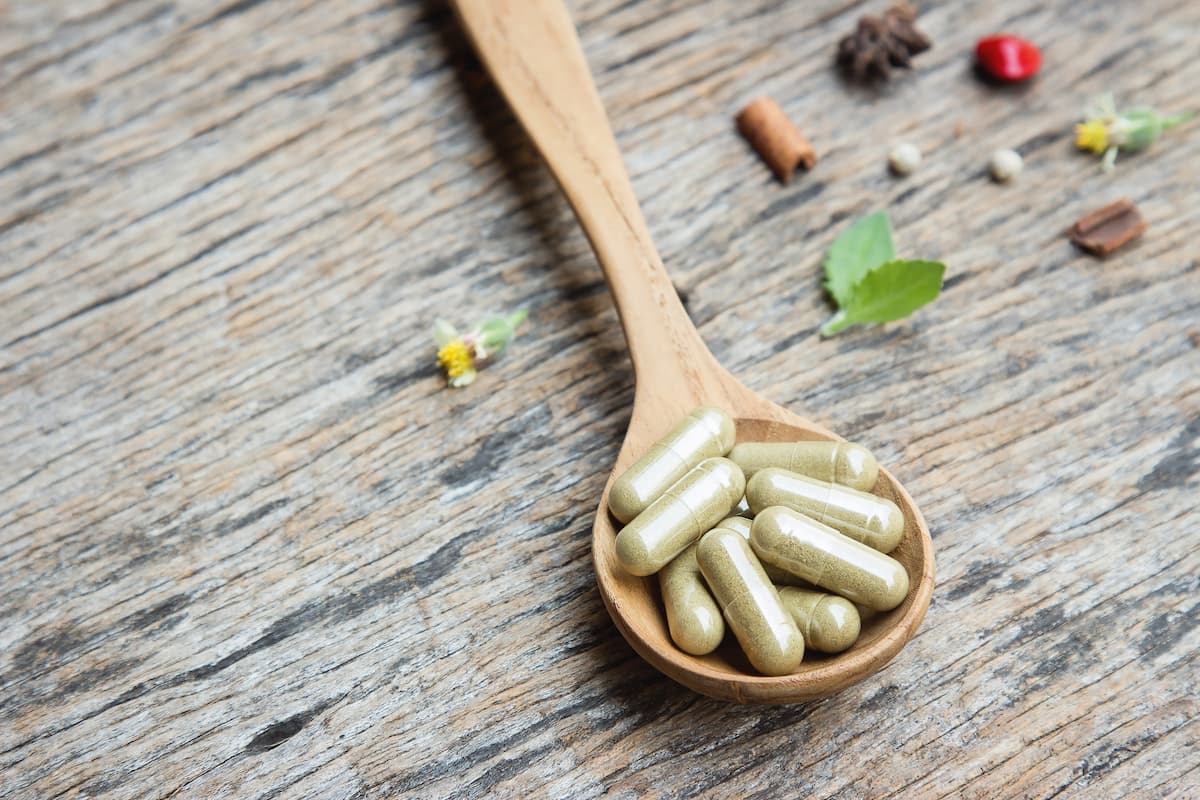
Ashwagandha affects thyroid hormone levels. Find out if you can use it.
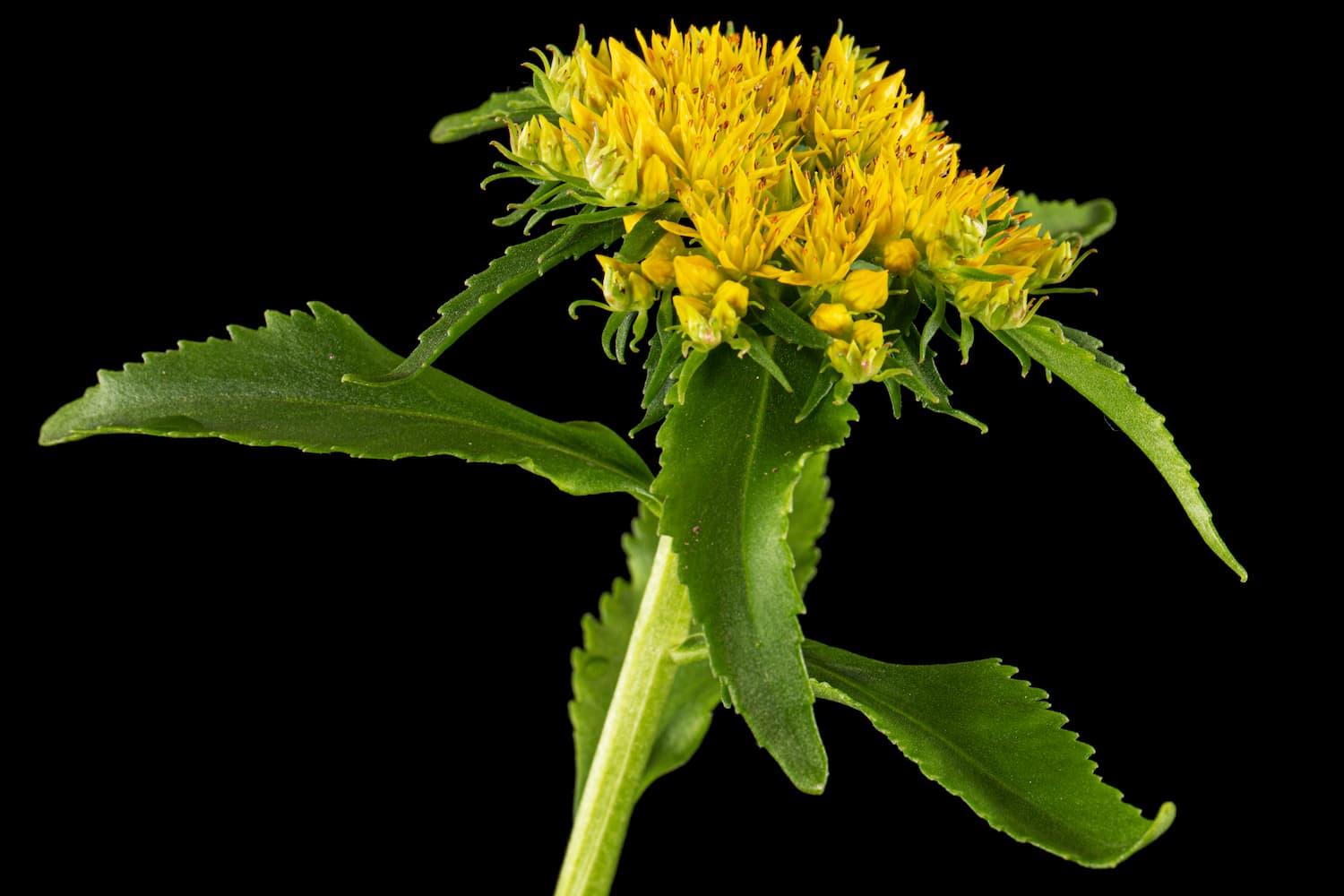
See how mountain pintail can affect your wellbeing.

Check out the opinions of doctors and other professionals about ashwagandha. Also find out what people on the forum think about it.
